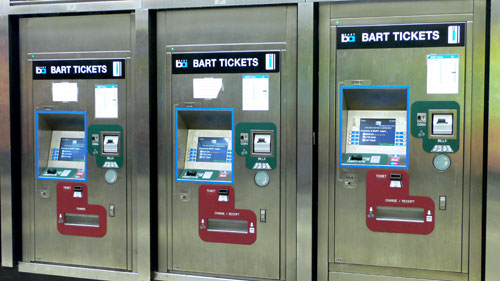
A three-person fact-finding panel appointed by Gov. Jerry Brown heard firsthand today how far apart BART and its labor unions remain even though they’ve been bargaining since April 1.
In fact, the two sides couldn’t even agree on some basic facts, such as the gap that remains in their respective proposals for wages and benefits for employees and how much the average union worker is paid.
Toward the end of the panel’s hearing at the state building in Oakland, which lasted for more than four hours, BART attorney Vicki Nuetzel said, “There is a significant gap in the proposals and “we are far apart.”
Nuetzel said, “We want to reach an agreement and are ready to bargain 24 hours a day” but she said that can’t be accomplished before the unions’ contracts expire Sunday night “unless there’s a change” in the unions’ proposals.
But Vin Harrington, an attorney for Service Employees International Union Local 1021, which represents 1,430 mechanics, custodians and clerical workers, said he believes it is management that must change its attitude in order to prevent a strike, alleging that the talks this year have been the most contentious since he started representing the union in 1978.
Harrington said, “At the outset there was a clear and different attitude about how we would proceed” and said the union had to go to arbitration to get permission to brief its members on negotiations and begin face-to-face talks with management.
Members of SEIU Local 1021 and Amalgamated Transit Union Local 1555, which represents 945 station agents, train operators and clerical workers, went on strike for four-and-a-half days at the beginning of July and threatened to go on strike again Monday morning if a contract agreement hadn’t been reached by Sunday night.
But, at the request of BART directors who asked for a 60-day cooling off period, Brown intervened at the last minute by appointing the board to investigate the labor dispute and asking it to report back to him by next Sunday.
Brown will then decide whether to grant the cooling off period. If he doesn’t, the unions said they’ll go on strike next Monday if there’s no agreement by then.
George Popyack, a negotiator for a third BART union, American Federation of State, County and Municipal Employees Local 3993, which represents about 210 middle managers, said its members honored the other unions’ picket lines during the strike in July and will join them if there’s another strike.
He said he agrees with Harrington that the chances of getting an agreement by Sunday night are slim unless there’s “an immediate change” by BART management.
In response to a question by a panel member who asked about the chances of reaching an agreement by Sunday, Popyack said BART hasn’t engaged in serious bargaining until recently but added, “Put enough money out there and we can do it.”
Nuetzel responded that putting more money on the table is “the position of all the unions” but said BART’s board of directors is “concerned” about where the money will come from.
BART officials told the panel that the two sides are still about $100 million apart on the terms of a new contract but Kate Hallward, an attorney for ATU, said her understanding is that they’re only $56 million apart.
BART management said the average union worker makes $79,000 a year in wages but Harrington said that’s only true if highly-paid management officials are included and the average union member makes the lower figure of $66,000 a year.
BART management said it’s now offering a 9 percent pay increase over four years but Harrington said that because management is asking workers to pay more for their health and pension benefits they will only see a net total compensation increase of about 1.4 percent over four years.
And he said that would come after employees already have had a pay freeze for four years.
Harrington told the panel, “We want a fair and equitable contract that takes into account the many years with no wage increases.”
The fact-finding panel is headed by Jacob Appelsmith, a senior advisor to Brown who also is Director of the Alcoholic Beverage Control Department.
Robert Balgenorth, a panel member who’s president emeritus of the State Building and Trades Council of California, said the panel won’t be making any recommendations to Brown and will “just say here are the issues the governor has to look at” and let him make the decision on whether to recommend a cooling off period.
Jeff Shuttleworth, Bay City News









